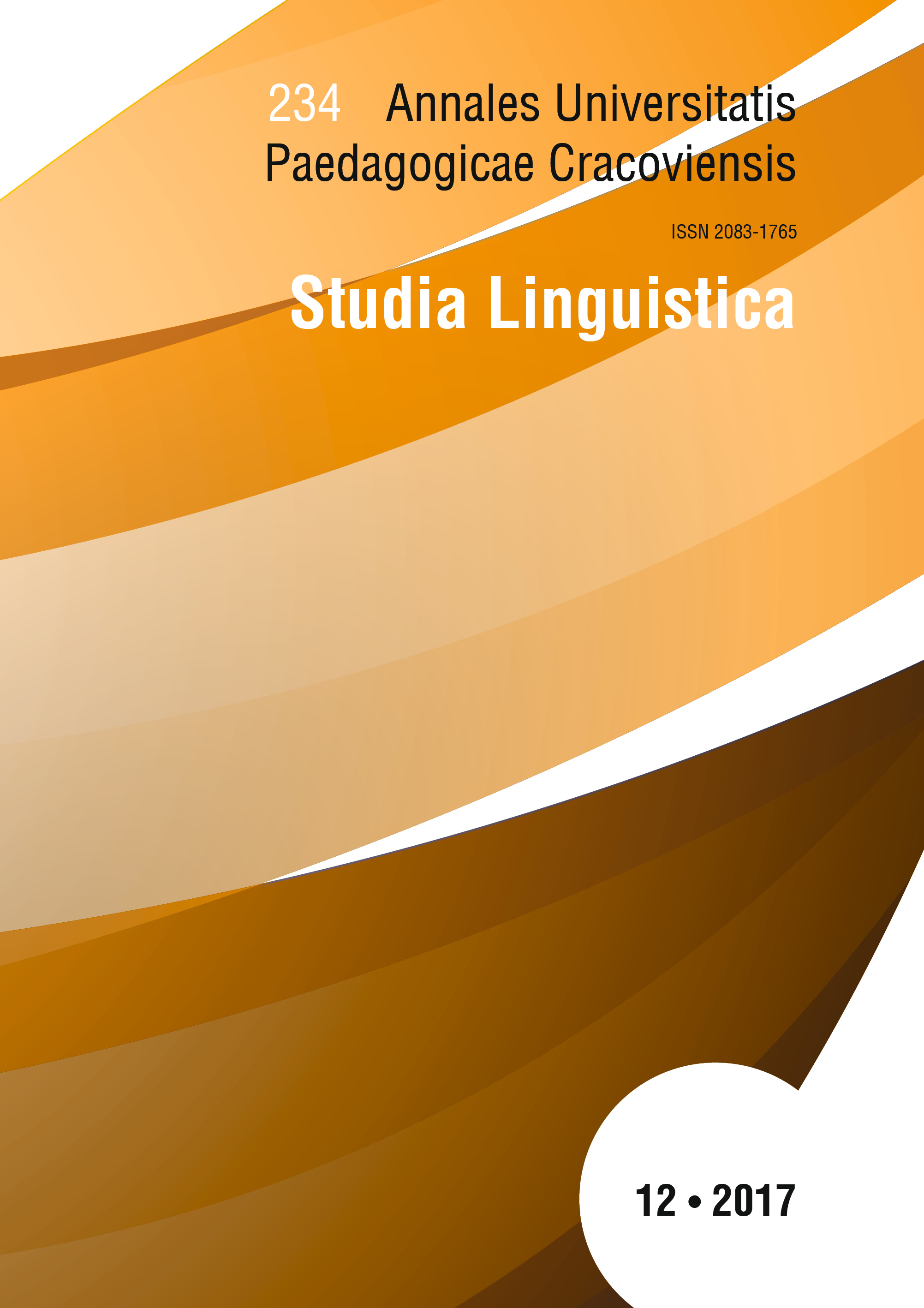A few notes on the inflection of adjectival multi-words units
Main Article Content
Abstract
The article presents an analysis of inflexive features of adjective idioms. The analysis proves that majority of adjective idioms are established as indeclinable units (characterized by fully syncretic forms), e.g. pełną gębą, bez serca, od macochy, etc. In other cases, the lack of textual occurrences of certain inflectional gender forms is a result of their semantic, e.g. wiecznie zielony, grubymi nićmi szyty, and not *wiecznie zieleni, *grubymi nićmi szyci.
Downloads
Article Details
Author, submitting a text to the editorial board of the journal “Annales Universitatis Paedagogicae Cracoviensis. Studia Linguistica", certifies that the content of the article has not been published so far and that the work does not violate in any way the copyright or related rights of other person, as well as other rights of third parties, and that no one's rights to the work (or any part thereof) have been missed. After signing the contract, the property rights to the published materials are transferred to the Scientific Publisher of the University of the National Education Commission, Krakow.
“Annales Universitatis Paedagogicae Cracoviensis. Studia Linguistica” is an open access journal, and all its content is made available free of charge to users and institutions under the Creative Commons CC-BY-NC-ND 4.0 license (attribution, non-commercial use, no derivative works). Under this license, the authors agree that their work may be lawfully reused for any purpose, except for commercial purposes, without the prior consent of the author or publisher. Everyone can read, download, copy, print, distribute and process these works, provided that the author's marking and the original publication place are correct. Published texts may not be used to create derivative works (e.g. to translate and publish in another language without the consent of the publisher). This is in line with the BOAI (Budapest Open Access Initiative) definition. "Studia Linguistica" does not charge for submitting or processing articles.
References
Bąba S., 1973, Osobliwości fleksyjne rzeczownika w stałych związkach wyrazowych współczesnej polszczyzny, „Poradnik Językowy”, z. 7, s. 398–407.
Google Scholar
Bąba S., 1982, Ograniczenie w zakresie kategorii liczby komponentu a stabilność struktury formalnej związku frazeologicznego, „Poradnik Językowy”, z. 3, s. 141–151.
Google Scholar
Bąba S., 1997, Z fleksji polskich frazeologizmów. Cz. I. Uwagi o odmianie wyrażeń, [w:] Synchroniczne i diachroniczne aspekty badań polszczyzny, t. III, red. M. Białoskórska, Szczecin, s. 141–154.
Google Scholar
Czerepowicka M., Kosek I., Przybyszewski S., 2014, O projekcie elektronicznego słownika odmiany frazeologizmów czasownikowych, „Polonica XXXIV”, s. 115–123.
Google Scholar
Grochowski M., 1982, Zarys leksykologii i leksykografii. Zagadnienia synchroniczne, Toruń.
Google Scholar
Kosek I., 2008, Fleksja i składnia nieciągłych imiennych jednostek leksykalnych, Olsztyn.
Google Scholar
Laskowski R., 1984, Fleksja. Zagadnienia ogólne, [w:] Gramatyka współczesnego języka polskiego. Morfologia, red. R. Grzegorczykowa, R. Laskowski, H. Wróbel, Warszawa, s. 97–120.
Google Scholar
Lewicki A.M., 1976, Wprowadzenie do frazeologii syntaktycznej, teoria zwrotu frazeologicznego, Katowice.
Google Scholar
Lewicki A.M., 1986, Składnia związków frazeologicznych, „Biuletyn PTJ”, z. XL, s. 75–82.
Google Scholar
Lewicki A., Pajdzińska A., Rejakowa B., 1987, Z zagadnień frazeologii. Problemy leksykograficzne, Warszawa.
Google Scholar
Liberek J., 2006, Zróżnicowanie aspektowe komponentów werbalnych w stałych związkach wyrazowych. Uwagi wstępne, [w:] Z zagadnień frazeologii, stylistyki i kultury języka, red. S. Bąba, P. Fliciński, Poznań, s. 44–66.
Google Scholar
Saloni Z., 1983, Bardzo wstępne uwagi o słownikowym opisie polskich frazeologizmów, [w:] Tekst i zdanie, red. T. Dobrzyńska, E. Janus, Wrocław, s. 353–363.
Google Scholar
